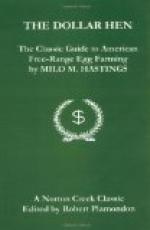It may be further said that with the present prevailing custom of holding eggs without storage facilities for the fall rise of price, eggs placed in cold storage in April are frequently superior to the current fall and early winter receipts. Cold storage eggs are generally sold wholesale as cold storage goods, but are retailed as “eggs.” The fall eggs offered to the consumer cover every imaginable variation in quality and the poorest ones sold may be a cold storage product, or they may not be.
The Bureau of Chemistry of the United States Department of Agriculture has recently announced the finding of certain crystals in the yolks of cold storage eggs that are not present in the fresh stock. This finding of a laboratory method of detecting cold storage stock was at first taken to be a great discovery. Further investigation, however, indicates that the crystal mentioned forms as the egg ages and that the rate of formation varies with the individual eggs and probably also with the temperature, so that while crystals may indicate an aged egg, the discovery only means that the microscopist in the laboratory can now do in a half hour what any egg candler in his booth can do in ten seconds.
At the present writing (February, 1909) there has been much talk of laws against the sale of cold storage eggs as fresh. The Federal Pure Food Commission, under the general law against misbranding, have made one such prosecution. Many States have agitated such laws but little or nothing has been done. I find that the idea of such a law is quite popular, especially with poultrymen. Contrary to popular opinion, the cold storage men and larger egg dealers are not opposed to the law. The people that are hit are the small dealers and especially the city grocers. These fellows buy the eggs at wholesale storage prices and sell them at retail prices for fresh, thus making excessive profits but cutting down the amount of the sales. This lessens the demand for storage stock and lowers the wholesale price. This is the reason the wholesaler and warehouse man are in favor of the law.
We may all grant that the opportunity given the small dealers to grab quick gains and in so doing hurt the trade ought to be abolished. But how are we to do it? “Have State and Federal branding of the cases as they go into or come out of storage,” says one—an excellent plan, to be sure by which the grocers could buy one case of fresh, eggs and a back room full of storage goods and do Elijah’s flour barrel trick to perfection.
Clearly government inspection and stamping of each egg is the only method that would be effective and the consideration of what this means turns the whole matter into a joke. The official inspection now maintained by the boards of trade of the larger cities may be extended and the producers, dealers and consuming public may be educated to appreciate quality in eggs, as they have been in dairy products. City and State laws may also be made which will taboo the sale of spot eggs or eggs that will float on water. Meanwhile, a great opportunity is open for the man who has high grade eggs for sale, whether he be producer or tradesman.




